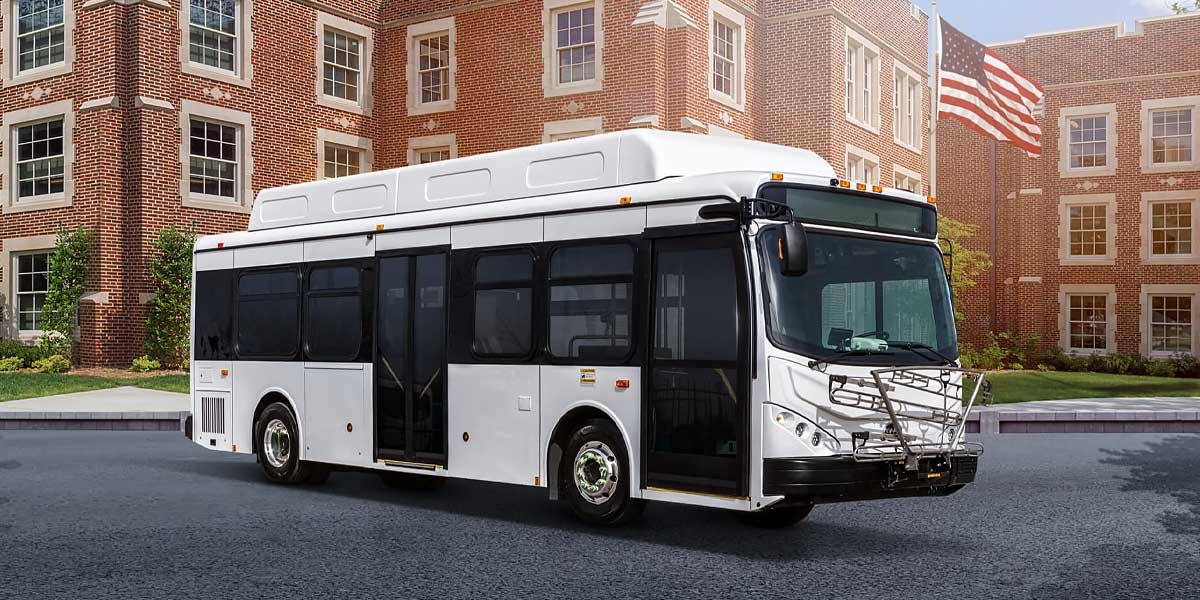BYD K7M 30' ELECTRIC BUS
BYD K7M 30' Electric Bus offers a zero-emission, efficient transport solution, featuring advanced battery technology for extended range. It provides a comfortable ride with a spacious interior, making it ideal for urban transit. Enhanced safety features and reduced operational costs make it a smart choice for city transportation.
User Rating: 3 / 5 (26 votes)





Base Trim Price: $0 USD *
| manufactured in | China |
| model year | 2018 |
| range (km) | 220 |
| battery (kWh) | 215 |
| bus type | citybus |
| seats (qty) | 23 |
* Minimum price set for the base trim by the manufacturer

Exterior and Interior photos of BYD K7M 30' ELECTRIC BUS
BYD K7M 30' ELECTRIC BUS Review
Embarking on the Electrified Odyssey with the BYD K7M 30' Electric Bus
Emerging as a paragon of innovation from the industrious lands of China, the BYD K7M 30' Electric Bus exemplifies the zenith of cutting-edge design and eco-friendly travel. Unveiled in the year 2018, this urban marvel harmonizes pioneering engineering and unwavering dedication to green commuting methodologies.
BYD's Ascent: Powered by Subsidiary Virtuosity
BYD, a global giant, owes its triumphant narrative to the vibrant synergies of its subsidiaries - BYD Automotive and BYD Electronic. Their magnum opus, the BYD K7M, is a formidable 30-foot titan in the electric bus genre that has amassed commendations from industry stalwarts and academic circles alike. This electrifying titan promises tranquil and seamless transport for both students and professionals, revolutionizing the very concept of hassle-free transit.
The BYD K7M: A Beacon in Varied Arenas
Transcending the precincts of educational institutions, the BYD K7M finds its metier in airports, concert venues, dense urban sprawls, and intricate parking structures. Its hallmark lies in its versatility, making it a paragon of choice for an assorted range of applications.
The Powerhouse Within: Lithium Iron Phosphate Batteries
Every entrant from BYD’s impressive lineup, including the K7M, is equipped with lithium iron phosphate batteries. Extolled for their unmatched safety, extensive lifespan, and versatile application, these batteries fortify BYD's commitment to designing sustainable, powerhouse electric buses.
The BYD K7M Charging Matrix: Adaptability Personified
Embodying the spirit of flexibility, the BYD K7M offers a multifaceted charging suite - whether it's wireless, overhead, or conventional AC/DC pathways. This adaptability ensures these electric giants can seamlessly integrate into any infrastructural or energy framework, markedly enhancing their efficacy.
Impressive Specifications: Battery Capacity and Charging Duration
Equipped with a robust 215 kWh battery, the BYD K7M promises unrelenting performance on the roads. This formidable power stash can achieve full replenishment in a mere three hours, ensuring minimal interruption in operations and boosting productivity.
Performance Metrics: Speed and Range
The BYD K7M transcends being merely an eco-friendly vehicle; it stakes a claim as a robust performer as well. With a top speed of 56 mph (90 km/h) and a range extending up to 158 miles (254 km), this electric bus redefines the performance boundaries of electric vehicles.
Visioning the Future of Public Transit: The BYD K7M 30' Electric Bus
The BYD K7M 30' Electric Bus, a crowning jewel in BYD's chronicle of innovation, echoes the future of public transportation. With its blend of green engineering, unmatched performance, and robust specifications, it is unequivocal that the next era of commuting is not just electric – it is distinctively BYD electric.
Watch the Video Overview
Full Specifications List:
| Distance | 155 miles (250 km) |
| Speed | 62 mph (100 km/h) |
| Acceleration | Not available |
| Power | 241 hp (180 kW) |
| Battery Capacity | 211 kWh |
| Battery Charge | Not available |
| Price | $0, €0, £0 |
F.A.Q. about BYD K7M 30' ELECTRIC BUS
What is the range of an electric motorcycle?
The BYD K7M 30' Electric Bus has an impressive range of up to 150 miles (241 kilometers) on a single charge.
How far can the electric bus/van travel on a single charge?
The BYD K7M 30' Electric Bus can travel up to 150 miles (241 kilometers) on a single charge, depending on driving conditions and load.
What is the battery capacity and how long does it last?
The BYD K7M 30' Electric Bus is equipped with a battery capacity of 215 kWh, providing a long-lasting power supply for extended usage.
How long does it take to charge the bus/van fully?
It typically takes about 3 to 4 hours to fully charge the BYD K7M 30' Electric Bus using a fast charger. Charging times may vary based on the charging infrastructure.
Are there sufficient/accessible charging stations available for the route?
Charging infrastructure is expanding rapidly, and many urban routes now have accessible charging stations. It's advisable to plan routes with charging points in mind.
What is the upfront/initial purchase price of the electric bus/van?
The initial purchase price of the BYD K7M 30' Electric Bus is around $300,000. Prices in Euros would be approximately €275,000 and in Pounds approximately £245,000, depending on the current exchange rates.
How do maintenance and operating costs compare to traditional buses/vans?
Maintenance and operating costs for the BYD K7M 30' Electric Bus are generally lower compared to traditional diesel buses, due to fewer moving parts and regenerative braking technology.
How does the bus/van perform in different weather conditions and terrains?
The BYD K7M 30' Electric Bus is designed to perform reliably in various weather conditions and terrains, providing consistent performance due to its robust electric motor and battery management system.
What is the energy efficiency of the bus/van?
The BYD K7M 30' Electric Bus offers high energy efficiency, typically consuming around 1.3 kWh per mile (0.8 kWh per kilometer), which is more efficient than many traditional diesel buses.
How many passengers can the bus accommodate?
The BYD K7M 30' Electric Bus can accommodate up to 22 passengers comfortably, making it suitable for urban transit and shuttle services.
Comparison:
Speed
Speed is mission-critical in urban transport, and the BYD K7M hits a top speed of 60 mph (97 km/h), ensuring it navigates cityscapes efficiently. The Proterra Catalyst E2, with a slightly higher top speed of 65 mph (105 km/h), might edge ahead on open roads. However, when stacked against the New Flyer Xcelsior CHARGE™ and Volvo 7900 Electric, both capping at around 62 mph (100 km/h), the BYD K7M sits comfortably within the expected speed bracket for this class.
Range
Range anxiety is a non-starter with the BYD K7M, boasting 155 miles (250 km) on a single charge. The Proterra Catalyst E2 reigns supreme here with an impressive 329 miles (530 km), which is nearly double. The New Flyer Xcelsior CHARGE™, clocking in at about 150 miles (241 km), and the Volvo 7900 Electric at 124 miles (200 km), offer respectable ranges but dont quite stack up to the BYD K7M’s middle ground.
Power
When it comes to power, the BYD K7Ms electric motor generates 180 kW (241 HP), which is sufficient for most city routes. In contrast, the Proterra Catalyst E2 packs a wallop with up to 220 kW (295 HP), making it a bit of a powerhouse. The New Flyer Xcelsior CHARGE™ and Volvo 7900 Electric offer slightly lower outputs at 160 kW (214 HP) and 200 kW (268 HP), respectively, showcasing the BYD K7M as reasonably powerful but not overly aggressive.
Charging Time
The devil is in the charging details. The BYD K7M has a fast-charging capability that juices its batteries in roughly 2.5 hours, making it relatively speedy. The Proterra Catalyst E2 can recharge in about 3 hours, while the New Flyer Xcelsior CHARGE™ offers a more leisurely 4-hour charge. The Volvo 7900 Electric varies, commonly falling in the 3-hour bracket, keeping it competitive but no standout here.
Price
Price is often the dealbreaker, and while exact figures for the BYD K7M arent publicly specified, its rumored to hover around the $450,000 mark (£350,000 or €420,000). The Proterra Catalyst E2 commands a steeper tariff of about $700,000 (£540,000 or €660,000). The New Flyer Xcelsior CHARGE™ sits in the premium territory at $750,000 (£580,000 or €710,000), and the Volvo 7900 Electric is similarly lofty, at around $715,000 (£555,000 or €675,000). Thus, it appears the BYD K7M might represent a more affordable entry point into the electric bus market.
In this electrifying showdown, the BYD K7M carves out its niche with a harmonious blend of speed, range, power, and price, standing its ground in a bustling field of electric titans.












